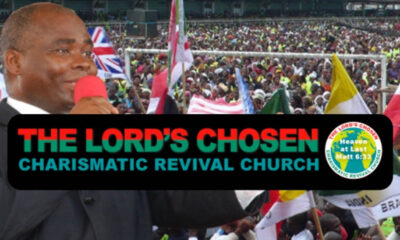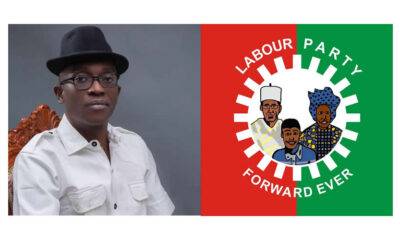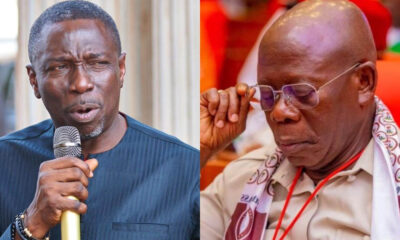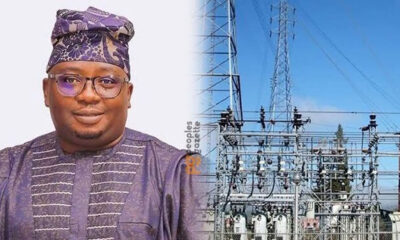Business
NERC presses DisCos to buy power directly from Gencos

NERC presses DisCos to buy power directly from Gencos
The Nigerian Electricity Regulatory Commission’s (NERC) recent directive for Distribution Companies (DisCos) to transition away from the single-buyer model contract with energy generation companies (GenCos) has sparked significant controversies in the power sector.
This shift has raised questions about the contract breach and the potential disruptions it may cause within the sector, with implications that could ultimately affect end-user customers.
The order which was introduced in July by the regulatory body is part of the unbundling of the electricity value chain, the Nigeria Electricity Supply Industry, also known as NESI.
Under the new directive, DisCos are now required to establish direct contracts with power Generation Companies GenCos, bypassing the government-owned Nigerian Bulk Electricity Trading Company (NBET).
Although this initiative appears to be a straightforward solution to streamline contract agreements within the power value chain, officials from the DisCos who spoke to Nairametrics believe the issue is far more complex.
Contract Obligations with the FG to be taken up by DisCos
With the elimination of the Nigerian Bulk Electricity Trading (NBET), the Distribution Companies (DisCos) are now expected to take on the responsibility of fulfilling certain contracts originally initiated by the federal government with generating companies.
A source who spoke to Nairametrics revealed that the DisCos will now bear the burden of certain contracts that gas companies had entered into with the federal government. These contracts must be fulfilled by the DisCos, even if there are other available options, the source said.
The source said, for instance, the federal government’s obligatory contract with the Azura power plant will have to be continued by DisCos, which is relatively more expensive than other gas and hydro companies.
READ ALSO:
- Nigeria telecom sector in intensive care unit, says MTN
- Edo gov poll: Igbinedion’s daughter dumps PDP
- JUST IN: 16 feared dead, 17 injured in Ibadan multiple accidents
“Azura has a more specific guarantee with the federal government. With its 437 MW capacity, DisCos will have to fulfil the contract with the company, even before turning to other alternatives,” the source told Nairametrics.
Minimum Power Outage Requirements
In the new bilateral power arrangement, Discos will also prioritize purchasing power from GenCos based on a structured approach that begins with their minimum power uptake requirements.
For instance, power generated by hydroelectric plants, which typically offer the most cost-effective electricity, will be the first choice for DisCos.
However, to prevent any single DisCo from monopolizing this affordable resource, each Disco will only be permitted to purchase a proportionate share of the hydroelectric power, corresponding to their grid allocation.
“For example, if a DisCo is responsible for 10% of the total power consumption from the grid, it will only be allowed to purchase 10% of the available hydroelectric capacity, which stands at around 1,500MW,” a top official from a DisCO informed Nairametrics.
This rigid structure might distort the market by limiting Discos’ ability to negotiate better deals or pursue more competitive power sources.
This could reduce operational flexibility and create financial risks for Gencos that are less utilized, such as those with higher costs.
“If you pay close attention to what the federal government, that is, NERC is saying, you’d realize that they’re saying they don’t want to pay for any form of electricity subsidy anymore with this new arrangement,” an official from Ikeja Electricity, speaking on condition of anonymity, told Nairametrics.
Infrastructural Challenges
In addition, the new arrangement could also result in infrastructure challenges, as the existing transmission and distribution systems may struggle to handle the varying power sources efficiently, leading to inefficiencies or power losses.
“This is the most important one if you ask me,” said a source.
“The issue isn’t just about power generation, but whether the grid has the capacity to handle an increased power output. Without significant investment in expanding substations nationwide, the entire system risks collapsing if the Distribution Companies (DisCos) receive more power than the grid can support,” the source said.
Phasing Out of Electricity Subsidy
The gradual elimination of NBET, a government-owned trading company, means the DisCos move to a “take-or-pay” contract, directly dealing with the gas companies.
By “take-or-pay” contract, NERC means the payment for gas will now be cost-reflective with little or no government assistance in balancing the receipt of either party.
READ ALSO:
- Ekiti: Four sentenced to life imprisonment for kidnapping
- Money laundering has reduced in West Africa, says GIABA
- Troops kill five terrorists, 44 surrender in Borno
“This is why it is a bilateral agreement. It’s between the two parties only.
“It is near matured because the market is still being supported by FG subsidy and other PSRP funding support which the market will be waned off from time to time,” Babajide Akintoye, an official in Eko DisCo told Nairametrics.
For Akintoye, such a free-market, cost-reflective contract would mean the federal government doesn’t have to step in to cover the loss of DisCos, which currently struggles with operational losses as well as inadequate revenues.
“Ordinarily, this arrangement wouldn’t have been a concern for the Discos in view of the subsidy portion of Disco revenues that the FG intends to provide to partially support monthly invoices issued to Discos from GENCOS with activated PPAs.
“But with the government finding ways to reduce its current electricity subsidies, this new agreement means whether DisCos current escrowed revenues will be sufficient to pay the invoices issued under proposed bilateral arrangements,” he added.
Electricity Subsidy no Longer Sustainable
Indeed, the government still has a huge influence in the power sector paying a huge bailout of subsidy to DisCos to help cover operational loss and poor billing of customers.
According to recent data from the new tariff plan for the eleven DisCos across the country, the federal government is projected to provide N1.7 trillion in electricity subsidies to the DisCos in 2024.
However, the Minister of Power, Adebayo Adelabu, has consistently stressed that this level of government subsidy is unsustainable.
He has advocated for the sector to transition from a subsidy-driven model to a more cost-reflective approach.
“What most people fail to realize is that while DisCos are responsible for the collection of electricity tariff, a huge bulk of it still goes to the GenCos and TCN. Only about 20% of all tariff collected is given to DisCos to run its operations.
“Another misconception is that we set tariffs, which we don’t. People easily blame us for an increase in their tariff because we’re the ones they see. But it’s the federal government that sets the tariff,” a top official in Abuja DisCo said.
“With this new order, DisCos will have to depend on its own meagre revenue and loans from banks to fund its own contract with the gas companies,” Olumide Jerome, another official from Abuja DisCo said.
More Customers to pay more for Electricity
The federal government has already excluded about 15% of electricity end-user customers from any form of subsidy.
These end-users, dubbed Band A customers, now pay a cost-reflective tariff on their electricity, paying N206.80/kWh from the N66/kWh, a more than 250% increase in tariff.
According to NERC, the federal government would have budgeted about N3.2 trillion to subsidise electricity in 2024 without a tariff hike.
But this is not the end of the increase in tariffs for customers. The goal is to extend the tariff to more and more customers who the federal government believes need to pay their fair share of electricity usage.
“I think both NERC and federal government are putting the cart before the horse. You see, most of the people under Band A and even most of the customers do not have a meter.
“How then do the government determine what they consume? They use an estimated billing model which is not always reflective.
“What I think the government should do is to meet the metering gap first then unbundle NBET. You can’t ask DisCos to get power from say Zungeru power plant without any assistance from the government and not expect them to increase tariffs or their revenue collections.
“It simply means you want people to pay more. I’m not just talking about Band A customers, but everyone will eventually start paying more if the DisCos have to balance their books,” energy expert, Oni said.
NERC presses DisCos to buy power directly from Gencos
nairametrics
Business
CBN reintroduces controversial cybercrime levy on all e-transactions

CBN reintroduces controversial cybercrime levy on all e-transactions
Bank customers of several commercial banks are in a state of confusion currently following the recent release of the fiscal guidelines of the Central Bank of Nigeria (CBN) which revealed that it will continue to enforce a reduced 0.005% levy on all electronic transactions.
The bank in its Monetary, Credit, Foreign Trade, and Exchange Policy Guidelines for Fiscal Years 2024-2025 document, revealed that as part of its 2024-2025 fiscal year guidelines, reaffirmed its commitment to this charge, requiring banks and other financial institutions to deduct the levy from all electronic transactions.
Scrutinizing the document, Daily Sun observed that the percentage has been reduced from 0.5% earlier announced in May 2024 to 0.005% in the new guidelines.
The apex bank noted that the levy is mandated by the Cybercrime (Prohibition, Prevention, etc.) Act of 2015 and added that the revenue generated from the levy supports a cybersecurity fund aimed at bolstering Nigeria’s defense against cyber threats, particularly in the banking sector. “The CBN shall continue to enforce the payment of the mandatory levy of 0.005% on all electronic transactions by banks and other financial institutions, in accordance with the Cybercrime (Prohibition, Prevention, etc.) Act, 2015”, it said.
The CBN’s guidelines also include provisions to ensure banks, Other Financial Institutions (OFIs), and Payment Service Providers (PSPs) comply with minimum cybersecurity standards, such as appointing Chief Information Security Officers (CISOs). These requirements stem from a 2022 risk-based cybersecurity framework that targets the growing threat of cyber attacks.
READ ALSO:
- Osun: Police arrest suspected Yoruba Nation members
- Suspected car thief nabbed in Niger State
- Police arrest DSP, inspector over manhandling of Lagos elderly woman in viral video
It will be recalled that the introduction of the levy had sparked controversy, with critics arguing that it adds unnecessary costs to businesses and could fuel inflation. The Centre for the Promotion of Public Enterprise (CPPE) and the Nigerian Association of Chambers of Commerce, Industry, Mines, and Agriculture (NACCIMA) had urged the government to cap the levy to mitigate its economic impact.
In response to these criticisms, the Federal government, through the Minister of Information, and the Federal House of Representatives called for a suspension of the levy pending further review.
Similarly, the CBN pulled the plug on the collection of levy, but the latest guidelines suggest that the CBN is determined to press forward with the levy despite the opposition.
An economic experts, who did not want his name printed, stated that the CBN could have released such guidelines as part of broader measures aimed at bolstering cybersecurity across financial institutions, especially given the rise in cyber attacks targeting the financial sector.
He however stated that it would be unusual for a central bank to impose such levies directly, as cybersecurity measures are generally handled through regulatory requirements or sector-specific compliance measures.
“I have looked at the guidelines too and I am a bit confused as to whether this has been reviewed thoroughly by the Federal Executive Council because the confusion could arise from how these guidelines were communicated or interpreted by different stakeholders like me.
Also, like I had said before, financial institutions, businesses, and perhaps even customers could be affected by this levy, depending on how it’s structured. Hence, further clarification from the CBN or the Federal Executive Council may be necessary to resolve the confusion surrounding the implementation of the levy”, he said.
CBN reintroduces controversial cybercrime levy on all e-transactions
Business
Suspend VAT, other policies impoverishing Nigerians – SMEs tell FG

Suspend VAT, other policies impoverishing Nigerians – SMEs tell FG
The National Association of Small and Medium Scale Enterprises (NASME) and financial experts have called on the Federal Government (FG) to suspend any new policy that may further impoverish Nigerians.
The unanimous call was made by respondents in separate interviews with the News Agency of Nigeria (NAN) in Ibadan on Tuesday.
The interview focused on the need to stabilise the economy as an increase in Value Added Tax (VAT) is being anticipated from 7.5 per cent to 10 per cent.
The Oyo State chairman NASME, Prince John Karunwi, said VAT, being a consumer tax, would make prices of goods and services shoot up.
According to him, the increase will deplete consumers’ purchasing power and reduce the quantity of items they can buy.
Karunwi said that the present situation had left most Nigerians without disposable income.
“The situation now is that after transportation, maybe people have little for feeding.
“If they now discover that for some certain products, the prices will go high, the demand for products that are not essential will, definitely, drop,” said the chairman.
He said the government should be patient and allow the economy to stabilise despite its drive to increase its internally generated revenue.
READ ALSO:
- Salary: FG vows to prosecute private employers paying below N70,000
- American govt approves Elon Musk’s Neuralink brain chip to restore vision
- Man remanded for allegedly defiling stepdaughter in Benue
An economist, Samson Olalere, said the idea to increase VAT at this point would further deepen the hardship of the common man.
According to him, people are already grumbling about the unwarranted fuel price increase and the high cost of living, as the new minimum wage increase is grossly inadequate.
He said the government should look inward and come up with ideas that would benefit the populace and reduce the hunger of common Nigerians.
“I say no to the increase in VAT. It is an abuse of the sensitivity of Nigerians,” said the economist.
Olalere wondered why the common Nigerian would be asked to sacrifice, tighten his belt, and keep faith in the government without enough consideration for him from the same government.
A financial expert, Sola Famakinwa, corroborated the opinions of others that an increase in VAT would amount to an increase in the prices of goods and services.
“There is no way the manufacturing industries would bear the cost of increased VAT; it would be passed down to the consumers.
“If what we hear about the proposed VAT increment is true, I do not think Nigerians can bear to have more burden added to their shoulders now,” Famakinwa said.
He noted that the government needed to reduce the economic hardship by introducing subsidies for necessities that directly affect Nigerians, considering that not all are government workers.
Recall that VAT was increased from 5 per cent to 7.5 per cent on Feb. 1, 2020.
However, the Presidential Committee on Fiscal Policy and Tax Reforms recently recommended an increase to 10 per cent from 2025, and to 15 per cent by 2027 or 2030.
Suspend VAT, other policies impoverishing Nigerians – SMEs tell FG
Business
Nigeria positioned to lead $7.7tn halal market – Shettima

Nigeria positioned to lead $7.7tn halal market – Shettima
Vice President Kashim Shettima has projected that Nigeria is on the path to becoming a major player in the global halal economy, which is expected to reach a market value of $7.7 trillion by 2025.
Speaking during the Halal Economy Stakeholders Engagement Programme at the banquet hall of the Presidential Villa in Abuja on Wednesday, Shettima said Nigeria’s demographic and economic size provide a strong foundation for positioning the country as a key player in the halal market.
Shettima highlighted the importance of reassessing the nation’s strengths and addressing its weaknesses to achieve this economic milestone.
He stated that the engagement with international stakeholders will help develop a comprehensive halal ecosystem and strategies that will allow Nigeria to tap into high-value global markets.
He praised the private sector for its contributions, especially in the financial sector, and called for further collaboration to deliver a robust halal economy.
READ ALSO:
- Major US labour union declines to endorse Harris, Trump
- 20 killed, 450 injured in second wave of blasts in Lebanon
- FG mutes new system against fraud, to enhance identity verification
He also urged stakeholders to support the administration of President Bola Ahmed Tinubu in creating a thriving halal ecosystem.
Shettima further noted the importance of attracting international investment through summits, roadshows, and business matchmaking events, emphasising that regional trade expansion via the African Continental Free Trade Area (AfCFTA) offers Nigeria a platform to become a leading supplier of halal goods and services across Africa.
Aliyu Bunu Sheriff, the Special Assistant to the President on Export Expansion, highlighted the economic potential of the halal sector.
He explained that increasing Nigeria’s halal exports to countries in the Organisation of Islamic Cooperation (OIC) from 2% to 6% over the next four years could boost the country’s GDP by $548 million.
Senator Abubakar Kyari, Minister of Agriculture and Food Security, provided key statistics, noting that Nigeria’s domestic spending on halal products and services was approximately $107 billion in 2022.
Nigeria positioned to lead $7.7tn halal market – Shettima
-

 Business2 days ago
Business2 days agoDangote refinery to transport 75% of fuel locally by sea
-

 metro2 days ago
metro2 days agoFour burnt to death, eight others injured in Ore-Ijebu Ode road crash
-

 Politics2 days ago
Politics2 days agoWhy I’ll work against Obi as running mate – Aisha Yesufu
-

 metro2 days ago
metro2 days agoUpdated: Controversial church testimony occurred in a dream, says Lord’s Chosen
-

 metro2 days ago
metro2 days agoLady laces food with laxatives to know those eating it
-

 Politics2 days ago
Politics2 days agoWe no longer recognise Abure as Labour Party chairman – INEC
-

 News2 days ago
News2 days agoIghodalo sues Oshiomhole for N20bn ahead of Edo election
-

 Opinion1 day ago
Opinion1 day agoOgun Waterside: Path to political recovery









